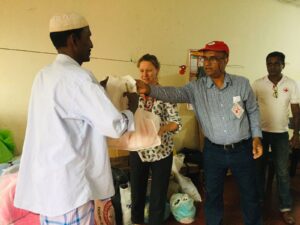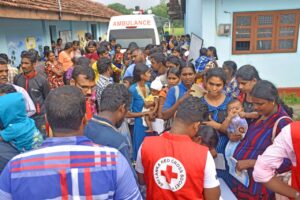Sri Lanka Rescues the Outlanders from the State of Rakhine: Sri Lanka Red Cross Society Steps Forward to be a Hope for the Stateless
“It was a perilous six-month journey from Bangladesh to Sri Lanka, with no food and heavy rains. We are a four-person family with two sons aged thirteen and two and a half. My husband (60) accompanied us on the trip, but he recently passed away…. Sri Lanka Red Cross Society has been extremely helpful in terms of survival,” says Lalaban (30).
Sri Lanka encountered a few outlanders from Myanmar arriving in northern Sri Lanka at the end of 2022. According to popular belief in Myanmar, the Rohingya are a stateless Indo-Aryan ethnic group who primarily live in Rakhine State. According to news sources; prior to the 2017 genocide against the Rohingya, when over 740,000 fled to Bangladesh, an estimated 1.4 million Rohingya lived in Myanmar.
Families from the group flee Bangladesh and travel all the way to the island of Sri Lanka, hoping for a better life. As soon as the Sri Lanka Navy informed the public about the stranded migrants, Sri Lanka Red Cross Society (SLRCS), the United Nations High Commission for Refugees (UNHCR), and Muslim Aid rushed to their aid.
Following a field assessment conducted by the Sri Lanka Red Cross Society (SLRCS) along with the International Federation of Red Cross and Red Crescent Societies (IFRC) team confirmed that the Sri Lanka Navy has received 105 displaced people from Rakhine, Myanmar, including 49 children (21 girls, 28 boys) and 56 adults (26 females, 30 males). Furthermore, among the arrivals were 21 unaccompanied children (8 boys and 13 girls) and 1 elderly person (68 years old), but no person with a disability (PWD). Three of the arrivals are admitted to the hospital due to their deteriorating health (2 children and 1 woman). The most significant barrier to communicating with displaced people in order to comprehend the situation has been identified as the language barrier.
Sri Lanka Red Cross Society visited the refugee shelters in Sarikkamulla, Panadura, Sri Lanka, and spent time listening to their side of the story. SLRCS met with women-headed households, families with differently-abled members, and large families who are merely playing the cards to live freely and happily on a daily basis. Lalabanu’s, Yasmin’s and Salimullah’s families were just a few of them.
“We were not allowed to work in Bangladesh, and our lives there were miserable; as a result, we decided to flee in order to live a better life. We are eternally grateful for the tremendous help we have received from SLRCS and other organisations. We were relieved to see that we were approaching an island after months of travelling in a boat, and even though the Sri Lanka Navy rescued us, we did not expect to receive this kind of shelter and support”, she added.
Lalaban, the 30-year-old young mother with tears in her eyes, continued, “SLRCS provided us with cash and food vouchers, as well as push-bicycles to improve and support our lifestyles. We were able to satisfy our hunger, and I was able to purchase a few necessities for my toddler. My sons and I have had a lonely and difficult life, especially since my husband’s death. This support has been of great support.”
The mother asked her thirteen-year-old son, who had just returned home from his tuition classes, and he expressed gratitude that they had received over Rs. 50,000 in cash and food vouchers from the SLRCS. The tiny family bereaved by his father’s death was seen in pain but grateful for whatever they received to live a little more freely than they had been.
SLRCS, in collaboration with the International Federation of Red Cross and Red Crescent Societies (IFRC) through the Disaster Response Emergency Fund (DREF) programme, not only provided shelter and food to these refugees, but also implemented initiatives to improve their stay in Sri Lanka. Along with UNHCR and Muslim Aid, they have received transport, cash and food vouchers, mobile phones, children’s tuition sessions and many more.
Next door was a little family with a 6-year-old daughter and a 22-year-old mother, Yasmin. Yasmin fled alone with her child seven months ago because the situation was difficult for her and her child, especially as a single mother. She was also forced to flee the country, and it was a difficult journey. “We received cash vouchers and food vouchers from the SLRCS, and that gave us strength to lift our heads for a few months,” said this young but brave mother towards the SLRCS. I was able to buy baby food, clothes, and food to last a few more days.
“I can’t thank you enough for being here for us. It’s beyond anything we’ve ever imagined, and we hope SLRCS stays with us because these organisations that have stepped forward to help us are our only hope,” said Yasmin, the 22-year-old single mother.
The aching stories added when the SLRCS and IFRC Colombo Delegation visited a home with four children, about how the 30-year-old father rescued his wife and four children in the hope of survival, “We had given up living, and our lives as refugees were miserable; we fled, spending whatever we had on faith.” Sri Lanka helped us in ways we didn’t expect, and the SLRCS ongoing support with cash and food vouchers, as well as looking into other ways to improve our lifestyles, such as providing push-bicycles, is something we didn’t expect at all”, says Salimullah.
SLRCS completed the DREF: Sri Lanka Population Movement 2022 programme while going above and beyond to help the people, which is a common story among SLRCS and the International Red Cross and Red Crescent Movement. The programme provided physical and mental support to the families in addition to meeting their basic needs. Educational, communication, and hygiene issues were addressed, while entertaining them with activities that brought a smile to the devastated.
Men, Women, and Children from the Rakhine State are safe in Sri Lanka due to the implemented programme; for us, it’s about serving people!
(By Meleeza Rathnayake, Assistant Manager; Communications of SLRCS)

